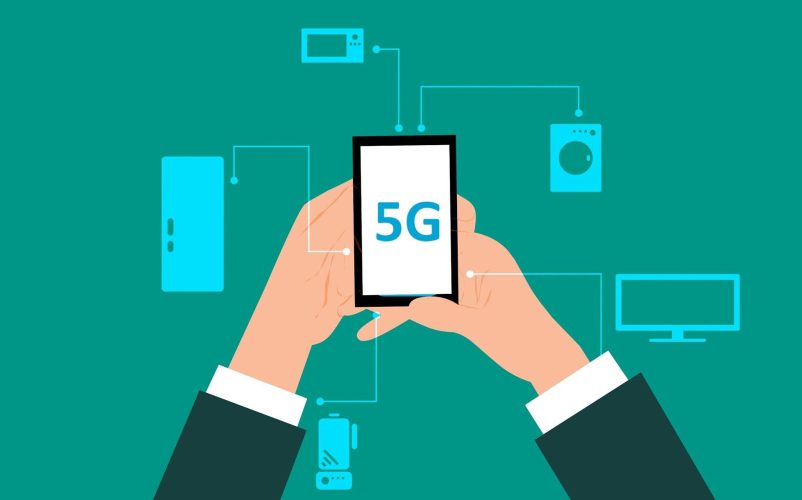EE and Vodafone have already launched their 5G networks in major cities, so your business might already be in a position to adopt 5G technologies. However, with the number of cyber-attacks on the rise and the recent security concerns of technology from Huawei, it is prudent to ask what the mobile phone networks are doing for 5G security?
Why your business should adopt 5G
We begin by taking a look at the benefits that 5G will deliver. Foremost, is the fact that your business can improve its efficiency and save costs. 5G will allow you and your workforce to download documents in seconds and collaborate with each other in real-time.
Higher data speeds on 5G are on average up to 10x faster than the average speeds of 4G. There is also a greater network capacity, which creates less latency in highly populated areas. These highly populated areas include those within the city centre’s, where most businesses operate.
It is clear that 5G is going to be a key part of our future. 5G will underpin current and future technologies such as remote surgery, automated vehicles, and smart cities. It will also drive new innovations in virtual reality, augmented reality, and artificial intelligence.
How the mobile phone networks have responded to Huawei 5G security concerns
On a global level, Huawei has signed contracts to install its technology within 50 5G networks. Over these 50 5G networks, Huawei’s technology will be employed in 150,000 base stations. These base stations transmit and receive the 5G radio signals that connect the user’s device to the network.
Huawei already has involvement in building the 5G networks across the UK. They are viewed as 5G technological experts due to their innovation and price-competitiveness.
- Vodafone – Huawei’s technology is being used in six out of the seven cities, where the Vodafone 5G network for business is already live. Vodafone has paused its deployment of Huawei equipment in its core network, in response to the security concerns associated with Huawei’s equipment.
- EE – Presently, Huawei is building 5G sites in the hundreds for EE. However, EE has stated it will not be using equipment from Huawei in core parts of its 5G network. EE is also removing Huawei technology from the core parts of its existing 4G and 3G networks. The EE 5G network for business offers further reassurances by stating that “we’ll send you instant alerts if your phone, network or data are potentially under threat, keeping your phone and its contents safe.”
- Three – The Three 5G network will launch in August. Three has a contract with Huawei to use its technology in non-core parts of its system. Three also highlights that Huawei’s 5G technology is assessed by the Huawei Cyber Security Evaluation Centre (HCSEC) in the UK, to ensure it is safe.
- O2 – The O2 5G network will launch in October and it will be the only 5G network in the UK that does not use the kit from Huawei. O2 stresses that there is no advantage to being first to launch 5G, due to the limited coverage on offer by the other networks. This may make O2 5G a favourite with businesses, who can choose O2 in just a couple of months time. O2 also points out that its existing 4G network is built on technology from Ericsson and Nokia.
The UK’s position on Huawei’s 5G technology
All of the mobile phone networks are at least following the advice of the government. At the moment, this advice allows the mobile phone networks to use Huawei’s technology in non-core parts of their 5G networks.
More specifically, this is the radio system parts that allow wireless communication over 5G. However, there has been some debate about what non-core parts of the network are. If the UK bans Huawei from any 5G network involvement, then the costs to the mobile phone network operators will be huge. This change of stance will also significantly delay the further rollout of 5G base stations and hence stop improved coverage in its tracks.
It is worth putting the use of Huawei’s technology into the perspective of what is in place in the UK today. Huawei’s hardware is being and has been used in the 3G and 4G mobile phone networks of the UK’s telecom providers.
5G is, for many reasons, recognized as being safer and more secure than 4G. So, businesses will, in fact, have stronger security than before, if they adopt 5G technologies. Most 4G networks were built with the lowest price being the driving factor.
5G networks are built in accordance with the 5G Standard. The 5G Standard enforces a common approach where security is built in from the ground up.
What the European Commission is doing about 5G security
The European Commission is acutely aware of the importance of security in technologies such as 5G. The European Commission has set out a timetable of events that will ensure that electronic communication security, data privacy, and critical infrastructure are prioritised.
Each of the 28 member states has made legal commitments to follow the European Commission’s timetable. This timetable includes two tasks that must be addressed before two key dates arrive:
- By the 1st of October – A European risk framework on 5G network security will be released, based on the national risk assessments delivered by each EU country.
- By the 31st of December – A toolbox of measures and best practices will be produced to mitigate 5G network security risks.
Businesses in the UK will ultimately need to make their own decisions on whether to adopt 5G technologies. With a very public introduction of 5G and its security, it is clear that the UK’s government, the EU, and the mobile phone networks, are all working to strengthen security against spying, manipulation, and cyber-attacks.
If you’re concerned about the effect 5G could have on your organisation’s security, contact one of our experts today.




